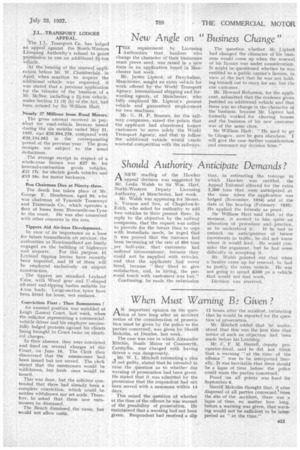Should Authority Anticipate Demands?
Page 35

If you've noticed an error in this article please click here to report it so we can fix it.
ANEW reading of the Hawker appeal decision was suggested by Mr. Leslie Walsh to Sir Wm. Hart, North-Western Deputy Licensing Authority, at Manchester, laSt week.
Mr. Walsh was appearing for Messrs.. S. Varnon and Son, of Chapel-en-leFrith, who asked for authority to add two -vehicles to their present three. In reply to the objection by the railway companies, that the request was rather to provide for the future than to cope with immediate needs, he urged that it was proved that the business had been increasing at the rate of 800 tons per half-year, that• customers had suffered inconvenience, because • they could not be supplied with vehicles, and that the applica`nts had never hired, because " they liked to give satisfaction, and, in hiring, the personal touch with customers was lost."
Continuing, he made the submission
that, in estimating the tonnage to which Hawker was entitled, the Appeal Tribunal allowed for the extra 2,300 tons that were anticipated at the time when the, application was lodged (November, 1934) and at _the date of the hearing (February, 1935). He applied the formula as proof.
.Sir William Hart said that, at the moment, it seemed to him quite an alteration of procedure and practice, as he understood it. If he had to embark on anticipations of future increments in traffic, he did not know where it would lead. He would consider the argument, hut he had some difficulty in accepting it.
Mr. Walsh pointed out that when • a haulier came up for renewal, he had to justify the extra vehicle. He was not going to spend £500 on a vehicle that would not find work. • Decision was reserved.




























































































